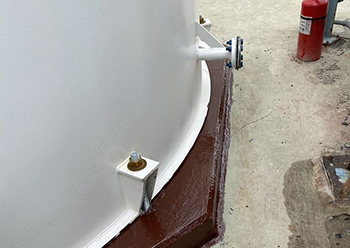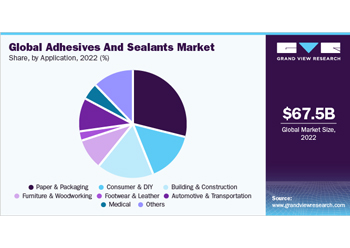

Facilities maintenance operations can face different circumstantial challenges which require modern solutions. Particularly for hazardous environments such as the oil & gas and petrochemical industries, cold-curing polymeric repair and protection materials can provide a novel means of bypassing these challenges, says Belzona, global designer and manufacturer of repair composite materials and industrial protective coatings.
This article details a successful project during which a customer used Belzona 7311 to cold bond pipe supports to a metal tank roof. In addition to the roof application, the chemical-resistant coating, Belzona 4311 (Magma CR1) was used to protect the tank base from chemical attack. The tank’s internal rubber lining made hot work impossible, meaning that the cold bonding solution was invaluable to completing the project.
What was the problem?
A metal storage tank in a chemical plant containing concentrated sulfuric acid required maintenance to both the base and the roof. The customer needed to bond pipe supports to the top of the tank to reinforce the pipes directly above. However, the tank was installed with a rubber lining, ruling out hot work such as welding as a means of attaching the pipe supports.
Meanwhile, the existing tank base coating had been exposed to chemical attack and needed to be replaced with a suitable chemical-resistant coating to protect the tank from future chemical spills.
Belzona 7311: A new cold bonding solution
Belzona’s first structural adhesive, Belzona 7311, proved to be the optimal cold bonding solution for the customer’s requirements due to its high mechanical strength, cleavage and shear resistance. By using this technology, the supports could be cold bonded to the top of the metal tank without the associated risks of welding such as damage to the rubber lining and metal distortion known as Heat Affected Zones (HAZ). HAZ can be the result of the intense process of heating and cooling the substrate, leading to weaknesses in the metal and compromising the integrity of the weld joint.
Bonding of the pipe supports
The contractor specified that the best way of attaching pipe supports was to cold bond six 254 mm by 254 mm (10 inch by 10 inch) metal plates to the top of the tank, which could then be cold bonded to the pipe supports. The chosen areas were marked with tape, before being prepared using handheld surface preparation tools. The application areas were prepared to SSPC-SP11 standard, producing a bare metal surface and a minimum 25 μm (1 mil) profile for a high level of adhesion.
The two-part epoxy adhesive, Belzona 7311, was then mixed and applied to both the substrate and the underside of the metal plates, before being held in place with no additional weight or pressure while the product was allowed to cure. Once the plates had been cold bonded to the metal tank, the pipe supports were subsequently attached to reinforce the pipes in operation above the tank.
Application of the chemical resistant coating
Belzona 4311 (Magma CR1) was specified to protect the tank base due to its chemical resistant qualities, having encountered no significant deterioration after a year of immersion in up to 98% sulfuric acid at 40°C (104°F), when tested in accordance with ISO 2812-1.
The previous tank base coating was removed and the concrete surface was prepared with an ATEX-rated power tool and conditioned using Belzona 4911 (Cleaner/Degreaser) to ensure maximum adhesion for the new coating.
Two coats of Belzona 4311 (Magma CR1) were applied to provide long-term protection to the tank base, avoiding the harmful financial, safety and environmental consequences of a future leak.
Results of the repair
The sulfuric acid tank base will be protected against chemical attack for the long term due to the chemical resistant properties of Belzona 4311 (Magma CR1). Meanwhile, the customer was impressed by the ability of Belzona 7311 to solve the challenges caused by the tank’s rubber lining, cold bonding the metal pipe supports securely without the need for welding. The customer was also very satisfied by the high mechanical strength, cleavage and shear resistance demonstrated by the cold bonding solution during the application.
Cold bonding solution in action
This application presented an example of the opportunities provided by the epoxy two-part structural adhesive, Belzona 7311 as a cold bonding solution, offering an effective and safe alternative to welding. The solution can be used for structural bonding applications requiring high mechanical strength, cleavage and shear resistance, including ladders, handrails and plate bonding, and is suitable for harsh service environments.

